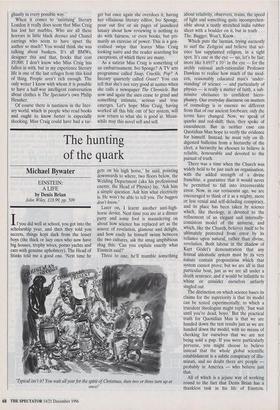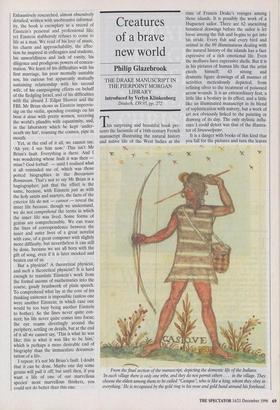The hunting of the quark
Michael Bywater
EINSTEIN: A LIFE by Denis Brian John Wiley, £18.99, pp. 509 If you did well at school, you got into the scholarship year, and then they told you secrets, things kept dark from the lesser boys (the thick or lazy ones who now have big houses, trophy wives, porno yachts and cars with genuine upholstery). The Head of Stinks told me a good one. 'Next time he gets on his high horse,' he said, pointing downwards to where, two floors below, the Welding Department (aka his professional enemy, the Head of Physics) lay, 'Ask him a simple question. Ask him what electricity is. He won't be able to tell you. The buggers don't lcnow.'
Later on, I learnt another anti-high- horse device. Next time you are at a dinner party and some fool is maundering on about how science has replaced art as the source of revelation, glamour and delight, and how easily he himself swims between the two cultures, ask the smug amphibious shag this: 'Can you explain exactly what Einstein said?'
Three to one, he'll mumble something 'Typical isn't it? You wait all year for the spirit of Christmas, then two or three turn up at once!' about relativity, observers, trains, the speed of light and something quite incomprehen- sible about a tautly stretched india rubber sheet with a boulder on it, but in truth. . . The. Bugger. Won't. Know.
Which puts the layman, trying earnestly to surf the Zeitgeist and believe that sci- ence has supplanted religion, in a tight spot. It's one in the eye — no, let's be fair; more like 8.6937 x 10-1 in the eye — for the archly rational arch-rationalist Professor Dawkins to realise how much of the mod- ern, reasonably educated man's 'under- standing' of science — and particularly of physics — is really a matter of faith, a sub- missive obeisance to confident hiero- phancy. Our everyday discourse on matters of cosmology is in essence no different from that of our ancient forebears; only the terms have changed. Now, we speak of quarks and red-shift; then, they spoke of ensoulment. But in neither case can Quotidian Man hope to verify the evidence for himself. Instead, he must rely on ill- digested bulletins from a hierarchy of the elect, a hierarchy he chooses to believe is reliable, honourable and devoted to the pursuit of truth.
There was a time when the Church was widely held to be just such an organisation, with the added strength of a divine franchise, a guarantee that it would never be permitted to fall into irrecoverable error. Now, in our revisionist age, we are encouraged to think of it as a mighty, more or less venial and self-deluding conspiracy, and its place has been taken by science which, like theology, is devoted to the refinement of an elegant and internally- consistent model of the universe, and which, like the Church, believes itself to be ultimately protected from error by its reliance upon natural, rather than divine, revelation. Both labour in the shadow of Kurt Godel's demonstration that any formal axiomatic system must by its very nature contain propositions which that system cannot prove; but we are all in that particular boat, just as we are all under a death sentence, and it would be infantile to whine or consider ourselves unfairly singled out.
The distinction on which science bases its claims for the superiority is that its model can be tested experimentally; to which a truculent theologian might reply, 'Just wait until you're dead, boyo.' But the practical truth for Quotidian Man is that we are handed down the test results just as we are handed down the model, with no means of checking for ourselves that we are not being sold a pup. If you were particularly perverse, you might choose to believe instead that the whole global scientific establishment is a subtle conspiracy of illu- minati, and no doubt there are people — probably in America — who believe just that.
All of which is a jejune way of working round to the fact that Denis Brian has a thankless task in his life of Einstein. Exhaustively researched, almost obsessively detailed, written with unobtrusive informal- ity, the book is exemplary as a record of Einstein's personal and professional life; yet Einstein stubbornly refuses to come to life as a man. We read of his love of music, his charm and approachability, the affec- tion he inspired in colleagues and students, his unworldliness and lack of vanity, his diligence and prodigious powers of concen- tration. We learn of his difficulties with his first marriage, his poor mentally unstable son, his curious but apparently mutually sustaining relationship with his second wife; of his campaigning efforts on behalf of the fledgling Israel, and of his difficulties with the absurd J. Edgar Hoover and the FBI. Mr Brian shows us Einstein improvis- ing on the violin, spending evenings on his boat iz dewc with pretty women, receiving the world's plaudits with equanimity, and, in the laboratory which he kept 'under- neath my hat', roaming the cosmos, pipe in mouth.
Yet, at the end of it all, we cannot say, `Ah yes; I see him now.' This isn't Mr Brian's fault. Everything is there. And I was wondering whose fault it was then — mine? God forbid! — until I realised what it all reminded me of, which was those potted biographies in the Breviarium Romanum. That's not to say Mr Brian is a hagiographer; just that the effect is the same, because, with Einstein just as with the holy saints and martyrs, the facts of the exterior life do not — cannot — reveal the inner life because, though we understand, we do not comprehend the terms in which the inner life was lived. Some forms of genius are comprehensible. We can trace the lines of correspondence between the inner and outer lives of a great novelist with ease, of a great composer with slightly more difficulty, but nevertheless it can still be done, because we are all born with the gift of song, even if it is later mocked and beaten out of us.
But a physicist? A theoretical physicist, and such a theoretical physicist? It is hard enough to translate Einstein's work from the formal axioms of mathematics into the coarse, gaudy brushwork of plain speech. To comprehend what lay at the core of his thinking existence is impossible (unless one were another Einstein; in which case one would be too busy being another Einstein to bother). So the lines never quite con- nect; his life never quite comes into focus; the eye roams divertingly around the periphery, settling on details, but at the end of it all we cannot say, 'This is what he was like; this is what it was like to be him,' which is perhaps a more desirable end of biography than the immaculate documen- tation of a life.
I repeat: it's not Mr Brian's fault. I doubt that it can be done. Maybe one day some genius will pull it off; but until then, if you want a life of one of our marvellous species' most marvellous thinkers, you could not do better than this one.



















































































































 Previous page
Previous page